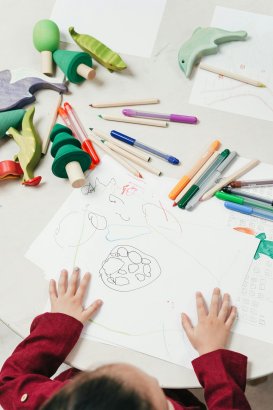
Crafting Curious Minds: How Parents Can Make Learning Fun
by Joyce Wilson, Guest Writer
Inspiring a passion for learning in children is a journey that transcends traditional education. As parents, our involvement and innovative approaches can ignite curiosity and enthusiasm in our young learners. By embedding creativity into everyday learning activities, we lay a foundation that not only educates but also excites. This guide from English Plus+ explores various strategies to enrich your child’s educational experience, making learning a thrilling adventure for the whole family.
Fostering a Social Learning Environment
Group learning activities like trivia nights, science experiments, or book clubs create engaging and enjoyable learning experiences for children. Such activities not only boost idea generation and question asking but also develop social skills and teamwork. By involving other families or siblings, you transform study sessions into fun, communal events. Regularly scheduled group projects foster a supportive learning atmosphere and make education a collaborative effort.
Leading by Example Through Lifelong Learning
Returning to school as a parent not only enhances your career prospects but also sets a powerful example of lifelong learning for your child. Now may be the perfect time to explore new opportunities and pave the way for a more rewarding job. For instance, exploring options for accounting degrees online can provide you with specialized skills in managerial accounting, estate taxation, and accounting research. Whatever path you choose, online programs offer the flexibility needed to balance work, school, and family commitments.
Cultivating a Daily Reading Habit to Create Lifelong Readers
Instilling a daily reading habit opens up a world of imagination and knowledge for children. Regular reading sessions enhance literacy, expand vocabulary, and foster empathy through diverse literary genres. Embedding this routine as a cherished part of their day ensures continuous engagement. By actively participating – reading together or discussing stories – you support the development of a lifelong reading habit.
Families that prioritize books in their home environment play a crucial role in nurturing lifelong readers. Children who grow up surrounded by books are more likely to develop a natural affinity for reading. Visiting libraries regularly and allowing children to choose their own books can further ignite their interest by giving them a sense of autonomy and excitement about stories. Additionally, when parents model reading for pleasure themselves, children see it as a valuable and enjoyable activity rather than just a task.
Creating an inviting reading space at home, complete with cozy seating and good lighting, can also encourage children to pick up a book. Coupled with a positive, book-rich atmosphere, these habits help build a foundation of curiosity and love for reading that will last a lifetime.
Celebrating Every Learning Milestone
Acknowledging every learning achievement motivates children and boosts their confidence. Celebrating successes – no matter how small – with simple acts like a family cheer or a special treat, makes learning rewarding. Such recognition shows children that their efforts are valued, encouraging them to persist and strive for further success. Celebrating each step they take reinforces the joy and value of learning.
Setting Goals Together for Focused Growth
Working together to set educational goals makes learning a shared and targeted pursuit. Allowing children to contribute to their learning goals ensures they are more engaged and committed to the outcome. By breaking down larger objectives into smaller steps, you help them progress without feeling overwhelmed. This collaborative setting of goals not only fosters a sense of independence but also enhances their sense of responsibility in their educational journey.
Encouraging Critical Thinking and Creativity
Encouraging children to think critically and creatively is achieved by posing open-ended questions that push them beyond straightforward answers. Asking how they might solve a problem creatively or predict alternative story outcomes enhances their analytical skills. Such questioning encourages deeper thinking and problem-solving, applicable across various subjects. Focusing on the process of critical thinking rather than the answers alone helps children understand the world in a nuanced way.
Learning Beyond the Classroom
Taking learning outside the classroom by visiting local museums, science centers, parks and nature, or cultural events makes education tangible and exciting. These outings not only deepen knowledge but also link classroom lessons to real-world contexts. Hands-on experiences, whether exploring a space exhibit or a cultural festival, make learning engaging and memorable. Such explorations stimulate curiosity and reinforce educational concepts in enjoyable ways with an impact.
Encouraging your child’s educational journey through creativity ensures that learning becomes an engaging and lifelong pursuit. By adopting inventive methods and participating actively in their academic life, we not only support their intellectual growth but also strengthen our bonds with them. These experiences are not just about acquiring knowledge; they are about creating memories that enrich their understanding and love for learning. As parents, our role is pivotal in transforming education into an enjoyable and continuous discovery process.
English Plus+ is here to take the sting out of grammar. Let us know if you have any questions!
Image via Pexels, used with permission.